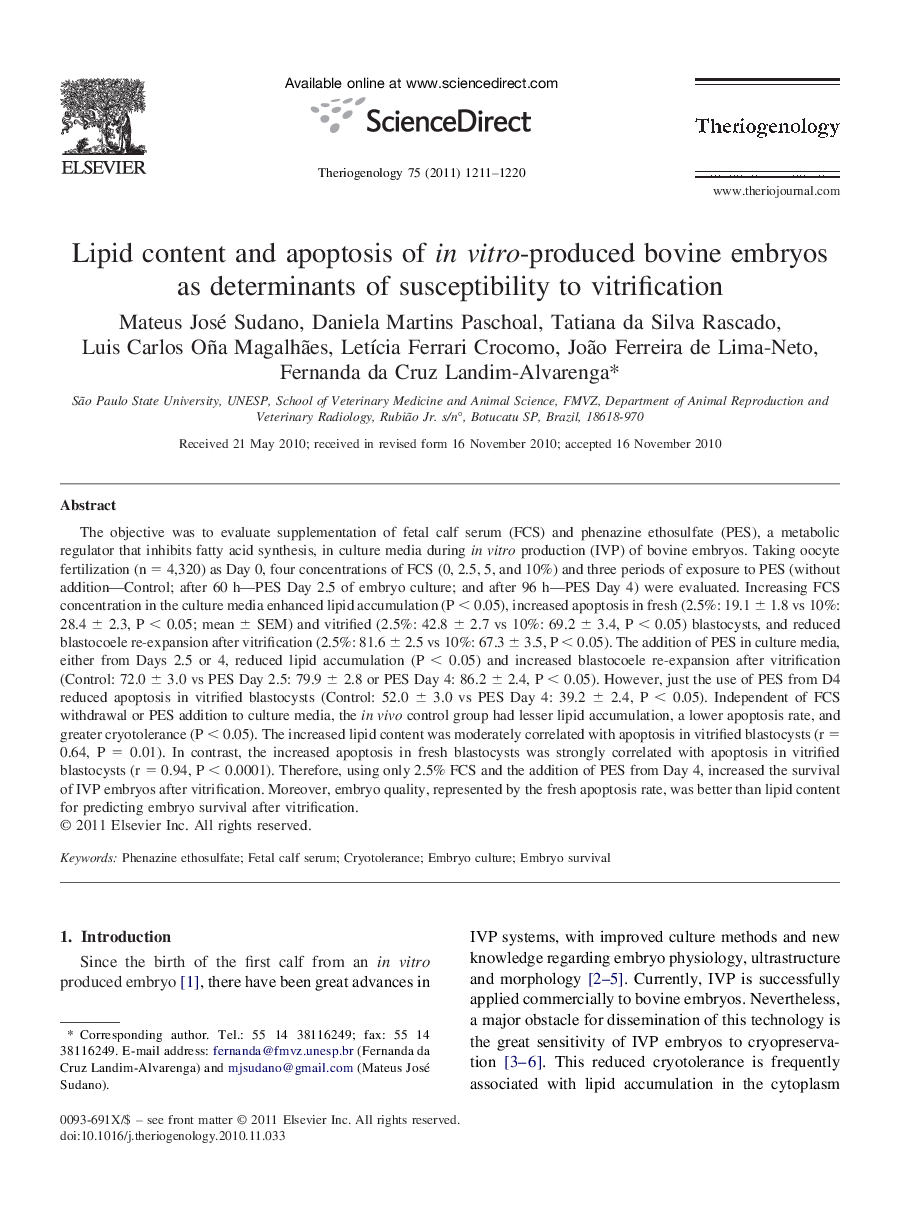| Article ID | Journal | Published Year | Pages | File Type |
|---|---|---|---|---|
| 10892801 | Theriogenology | 2011 | 10 Pages |
Abstract
The objective was to evaluate supplementation of fetal calf serum (FCS) and phenazine ethosulfate (PES), a metabolic regulator that inhibits fatty acid synthesis, in culture media during in vitro production (IVP) of bovine embryos. Taking oocyte fertilization (n = 4,320) as Day 0, four concentrations of FCS (0, 2.5, 5, and 10%) and three periods of exposure to PES (without addition-Control; after 60 h-PES Day 2.5 of embryo culture; and after 96 h-PES Day 4) were evaluated. Increasing FCS concentration in the culture media enhanced lipid accumulation (P < 0.05), increased apoptosis in fresh (2.5%: 19.1 ± 1.8 vs 10%: 28.4 ± 2.3, P < 0.05; mean ± SEM) and vitrified (2.5%: 42.8 ± 2.7 vs 10%: 69.2 ± 3.4, P < 0.05) blastocysts, and reduced blastocoele re-expansion after vitrification (2.5%: 81.6 ± 2.5 vs 10%: 67.3 ± 3.5, P < 0.05). The addition of PES in culture media, either from Days 2.5 or 4, reduced lipid accumulation (P < 0.05) and increased blastocoele re-expansion after vitrification (Control: 72.0 ± 3.0 vs PES Day 2.5: 79.9 ± 2.8 or PES Day 4: 86.2 ± 2.4, P < 0.05). However, just the use of PES from D4 reduced apoptosis in vitrified blastocysts (Control: 52.0 ± 3.0 vs PES Day 4: 39.2 ± 2.4, P < 0.05). Independent of FCS withdrawal or PES addition to culture media, the in vivo control group had lesser lipid accumulation, a lower apoptosis rate, and greater cryotolerance (P < 0.05). The increased lipid content was moderately correlated with apoptosis in vitrified blastocysts (r = 0.64, P = 0.01). In contrast, the increased apoptosis in fresh blastocysts was strongly correlated with apoptosis in vitrified blastocysts (r = 0.94, P < 0.0001). Therefore, using only 2.5% FCS and the addition of PES from Day 4, increased the survival of IVP embryos after vitrification. Moreover, embryo quality, represented by the fresh apoptosis rate, was better than lipid content for predicting embryo survival after vitrification.
Related Topics
Life Sciences
Agricultural and Biological Sciences
Animal Science and Zoology
Authors
Mateus José Sudano, Daniela Martins Paschoal, Tatiana da Silva Rascado, Luis Carlos Oña Magalhães, LetÃcia Ferrari Crocomo, João Ferreira de Lima-Neto, Fernanda da Cruz Landim-Alvarenga,
